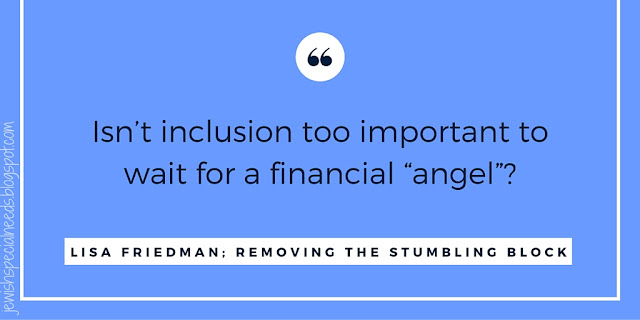I am often contacted by colleagues at other synagogues looking to become more inclusive. One in particular shared that a member of her community is interested in endowing a special education program for their religious school and she hoped that I might be willing to dream with them a little. So she asked me, “What would you do with $30,000? With $50,000?” Wow!
First and foremost, just as every child with a disability is unique, so is every synagogue community that seeks to include them. Therefore, my answer to the question will vary depending upon a number of factors:
- Do you have an existing program to expand or is this start-up?
- Do you have identified students in your community that you seek to serve, or do you hope to build a program that will attract students and families to your synagogue?
- What is your school’s vision? What is it you hope/want for each student when he/she completes your program? And how do you get them there?
Why is the most common question asked when I give a presentation or lead a workshop: “How do you afford it?”
(Disclaimer: The synagogue I spoke with already has great partnerships in disability work and are now fortunate to be receiving this gift to build upon what they have started.)
Let’s go back, for a moment, to question number three above. Vision. Shouldn’t EVERY school’s vision incorporate inclusion? We talk often about adaptations, modifications, and accommodations; and they are essential. However, I'm not sure we talk often enough of vision. True inclusion is figuring out how to ensure that your vision is not compromised for the sake of providing special services. Rather, you must provide the supports each student needs so that the school’s vision can be a reality for every student.
I get it, trust me. I live in the real world of synagogue life; the world of declining membership, financial struggles, and tough choices. Sure, there are angels out there…but isn’t inclusion too important to wait for an “angel”?
Isn’t it essential that we make inclusion a reality regardless of our means?
Click here to read Affording Inclusion - Part 2
Sign up here so you never miss a post from Removing the Stumbling Block:


Lisa! I love this! " True inclusion is figuring out how to ensure that your vision is not compromised for the sake of special education." I find myself giving up the dream and trying to go it alone by home schooling- We have 6 other children and now 8 grandchildren and I don't want to "fight" the system anymore. None of our private schools can "accommodate" and our public school falls way short- thank you for this reminder!
ReplyDeleteCindy, I am so glad that this was helpful for you. I appreciate your comment and hope that you will find a renewed sense of seeking what is not only possible, but a right.
Delete